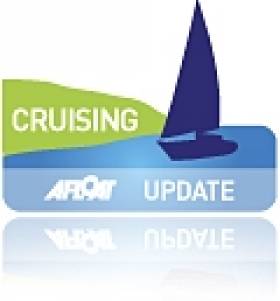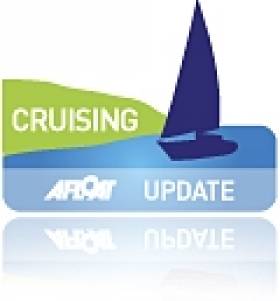Displaying items by tag: World Cruising Club
The Sun Goes Down on ARC+ 2022 in Grenada
The 10th edition of World Cruising Club’s popular ARC+ rally concluded last night with a spectacular prizegiving ceremony held for the 400+ crews from 91 boats taking part in the second 2022 ARC+ to finish at Camper & Nicholsons Port Louis Marina, Grenada. Over 400 crews from 27 countries, sailing under the flags of 22 nations had completed the two-stage transatlantic 3,000NM rally, from Las Palmas de Gran Canaria to Mindelo, Cape Verde Islands (850NM), with the final landfall in the Caribbean spice island of Grenada (2,150NM). The ARC+ is a truly international affair, attracting participants from around the world, as well as a highly diverse fleet and demographic of sailors; young and old (aged 3 to 76 years); boats large (21.07m (67’) and small (9.75m (32’), and yachts old (from 1979), and new (six boats built in 2022).
With first arrival Fra Diavolo (ITA) finishing 12 days previously and Earendel (GBR), the only motorboat in the rally (a late starter from Mindelo), arriving just as the final prizegiving was starting, it was time to applaud everyone in this ocean-crossing community with awards for sailing performance and contributions to the amazing rally spirit that has developed over the past six weeks. With the sun setting and a steel pan playing, Prickly Bay Marina was the perfect setting for the final coming together of crew members, including the many children in the fleet; all there to celebrate crossing the Atlantic Ocean and their terrific achievements in the 2022 ARC+ rally.
Paul Tetlow, Managing Director of World Cruising Club (Designate) was assisted by Nikoyan Roberts, Nautical Development Manager at Grenada Tourism Authority, presenting prizes on behalf of the Hon. Lennox Andrews; Minister for Economic Development, Planning, Tourism and CEO Petra Roach, who were unable to attend. Zara Tremlett, General Manager at Camper & Nicholsons Port Louis Marina also helped hand out an array of silverware, plaques, Grenadian gift baskets, and a whole host of special prizes and vouchers to the worthy winners.
 A packed ARC 2022 Prizegiving in Grenada Photo: Travis Ranger
A packed ARC 2022 Prizegiving in Grenada Photo: Travis Ranger
Proceedings began with a sincere recognition of the teams and people in Grenada who play an important part in the rally, and who have put so much into organising ARC+ 2022 once again. All were thanked for their invaluable day-to-day support in the seamless delivery of the rally: Grenada Tourism Authority; especially Nikoyan Roberts, who had been responsible for the GTA input into planning; Zara Tremlett, General Manager, and all her staff at Camper & Nicholson Port Louis Marina who have worked tirelessly to accommodate the ARC+ fleet; the Marine and Yachting Association of Grenada (MAYAG); and last but not least, the amazing participants of ARC+ and their friends and families, some of whom joined them at the awards.
The ARC+ is a rally and not a race, but this does not mean that the crews do not want to make good speed and get the most out of their boat and team’s capabilities as they head across on the long ocean passage. Recognition in the form of prizes and applause was given to the winners in the various divisions and included the first to cross the finish line in the Cruising Division, Vincenzo Addessi’s Mylius 60 Fra Diavolo (ITA). The team sailed a course of 2440NM in 9 days 5h 46m 49s.
Moving on to the results based on WCC handicaps, with a motoring penalty applied, it was time to award those in the Multihull Division. Once again, it was Pierre De Saint-Vincent’s French Outremer 51 Piment Rouge (FRA), who took Multihull Line Honours, and was also first on corrected time for the second year running. Their elapsed time of 11 days 12hrs 20mins 06secs bettered their 2021 time by over 3 ½ days, thus setting a new record for ARC+ multihulls going forward. “Piment Rouge, you and your crew provided so much energy to the ARC+ Rally and were happily up at whatever time in the morning to welcome in several other crews and to get the party started. Thank you for being such fantastic participants,” said Paul Tetlow. In 2nd place, was sister ship, Helia2 (USA), Rob & Ginny Beams’ Outremer 51, followed in 3rd by the Lagoon 42-2 Balance3 (FIN).
The ARC+ Cruising Division was split into four classes based on handicaps; with Hallberg-Rassy 48 MK II Blonde Moment (GBR) topping Class D, Amel Super Maramu 2000 Simoussi (BEL) 1st in Class C, Baltic 51 Alexandra (SWE) 1st in Class B and Mylius 60 Fra Diavolo (ITA) winning Class A.
It was not just the crews who were successful in the competitive side of the rally who received prizes; there were many other awards given out for happenings at sea, the closest finish and longest distance sailed, most beautiful boat, as well as recognising double-handed crews who took part, plus the SSB Net controllers for their great work and assistance during the crossing.
ARC+ always attracts many families and this year is no exception, with 36 children under the age of 16 sailing on 18 different boats; with the youngest, 3‐year‐old Herman Habenicht on Ballerina. It was to raucous applause that the young sailors in the fleet took to the stage to collect their certificates and special ARC+ branded Grenadian chocolates. “Crossing the Atlantic is an impressive feat at any age, but these children have achieved it very early on in their lives!”, said Paul Tetlow.
“Just arriving in Grenada is a huge achievement but we appreciate that it is not always easy, things can go wrong and things don’t go to plan, but you all got here. Along the way, things happened and the spirit of this rally is how people deal with those adversities,” said Paul Tetlow who explained that crews nominated recipients of the next awards to recognise their personal appreciation of extraordinary things that were carried out at sea.
The crew of Swn y Mor nominated and presented Karen on Mistral of Portsmouth for the Bravery at Sea Award after she went up the mast to cut away the Super Zero caught around the forestay in rough conditions, shortly after leaving Mindelo. Deserving more than just bruises in recognition of her heroic work, she was invited to the stage and received a basket filled with Grenadian goodies. The Facing Adversity Award went to the crew of Hanuman (USA), as nominated by Helia2. On the first leg, on their third night at sea, the Catana 53 hit a submerged object. The crew calmly informed Rally Control of their situation that their port hull had been hit and the starboard rudder smashed off. Managing to plug the leaks and later jump into the water to confirm there was no further damage to their saildrive, the crew sailed Hanuman on to Mindelo. They maintained positivity and good humour, and made started leg 2 with the rest of the fleet to Grenada.
Two ‘Standing By’ Awards were presented. The first was presented to Infinity for shadowing Helga all the way to the finish when they reported concerns about excessive movement in their rudder post, as well as a leakage of water into their machinery space. The second Standing By Award went to Alexandra, recognising the seamanship and assistance provided by the crew to Alika following their serious incident on board their Oyster 675, which was the beginning of a 10-day ordeal for the crew. “Alexandra saw the vessel in distress and made several calls by Sat phone to Rally Control which in turn allowed us to inform the MRCCs of the unfolding incident. The crew stood by Alika and transferred medical supplies before being released to continue their crossing to Grenada. They received the second Standing By Award of the evening, recognising the seamanship and assistance provided by the crew,” said Paul Tetlow as the crew accepted the award on stage.
The last, but not least, award of the prizegiving evening was the Spirit of ARC+ awarded to the crew of Outremer 45 One Piece in recognition of their standby support and great seamanship.
“One Piece demonstrated the highest levels of support that sailors are willing to give,” said Paul Tetlow. “They diverted their course to rendezvous with Alika in difficult conditions. The crew provided frequent Satcom updates to Rally Control and email updates. They stood by Alika and gave support and attention on the VHF so that they could help run the boats. They left them when arrangements to sail north to better conditions with a motor vessel had been established. However, that was not the end of their story as they then had a drama to contend with. They lost the starboard rudder, suffered ingress of water and kept Rally Control informed so we could alert the MRCCs. They displayed a great amount of seamanship in their time with Alika and also in getting themselves to safe port. It was a fantastic and well-deserved welcome on the docks when they finally arrived in Grenada.”
Skipper of Alika, Ross Allonby sent a heart-felt message to read out at the prizegiving, highlighting seamanship at the highest level and selfless kindness demonstrated by fellow ARC+ participants: “We are sorry not to be with you at the prizegiving. ARC+ has been a memorable event for us all and we will have more sailing stories. I personally look forward to less stressful passages in the future. The camaraderie, friendship and shared passion for the sea has been a reminder of the goodwill and fortitude of fellow sailors. We thank you all for your warm wishes and wish you safe and happy sailing in the future. Fair winds from Team Alika."
The rally this year has been one of great seamanship, unique friendships have been formed, special memories have been made and the ocean sailors of ARC+ 2022 can all feel rightly proud of their achievements to reach the shores of Pure Grenada, the spice island.
Classic Malts Selection Whiskies Add Flavour to Cruising Event
The Malts Cruise is a two week summer sailing voyage, combining exceptional cruising around the remote Hebridean waters, with a journey of discovery into the world of Scottish single malt whisky. A programme of cruising in company and solo exploration is mixed with social events ashore and rendezvous afloat.
The Malts Cruise starts in Oban, with rendezvous in Tobermory and Loch Tarbert Jura, before finishing in Port Ellen. Parties, crew dinners and a ceiledh are mixed with visits to distilleries, plus briefings on Scottish wildlife, history and culture take place along the route. Between rendezvous yachts can follow their own itinerary, exploring ashore and afloat, alone or in groups.
Any vessel can take part, as long as it's crewed by two or more people. The event will be popular with bareboat and skippered charterers, as well as boat owners from the British Isles, Scandinavia and northern Europe. For 2011, places are limited to 50 boats. To date 19 boats are entered, both power and sail ranging from 14.6m to 9.8m.
Malts Cruise Key Dates:
08 July 2011 - cruise office opens in Oban Marina, Kerrera
09 July 2011 - welcome party in Kerrera
10 July 2011 - parade of sail in Oban Bay
21 July 2011 - final party in Port Ellen
Malts Cruise Cost:
No boat fee. £225 per person. Children under 18 are free.
Quotes from participants of Classic Malts Cruise 2009:
"Doing the cruise gave the incentive to cruise further than my normal cruising area, so was able to enjoy and experience the area, scenery and the abundance of wildlife we saw (minke whales, porpoises, dolphins and sea eagles to mention just a few). Many thanks - certainly one of the 'must do' cruises." Eriska (GBR) Hallberg Rassy 312
"It was a great way to get my first taste of cruising in Scotland." Blue Fox (IRL) Oyster 461
The Malts Cruise website is available at www.worldcruising.com/maltscruise
2011 Afloat Almanac: If you're contemplating a cruise, short coastal passage or even just studying for a Nav course this season, don't forget the 2011 edition of the Afloat Irish almanac (with Reeds Data). It covers the whole of Ireland, the Scottish, English and Welsh West coasts. Buy it online. CLICK HERE Easy!
No Irish Cruisers Among Record Atlantic Rally Fleet
With one week to go before the ARC 2010 fleet leave Las Palmas for Rodney Bay in Saint Lucia, there are no Irish yachts entered in a fleet of 205 yachts drawn from 28 nations. Crews from the yachts already berthed in the marina took part in the official ARC 2010 Opening Ceremony. The final 34 yachts are expected to arrive in Las Palmas over the next few days, bringing the fleet total to 239 yachts, an all-time ARC record.
At midday Sunday 14 November hundreds of ARC participants took part in the Official Opening Ceremony for ARC 2010. Flag bearers from 28 different nations representing the countries of the yachts in this year's event led the procession as it made its way around the marina. The grand parade had a real festival atmosphere as crews gathered at the northern end of the marina and were led by an enthusiastic brass band cheered on by local spectators.
Andrew Bishop, Managing Director of World Cruising Club declared ARC 2010 officially "open" and the country flags were proudly hoisted on flagpoles around the marina as fireworks were launched in celebration. Sr Benito Cabrera from the Concejal del Ayuntamiento de Las Palmas (City of Las Palmas), Sr Jesus Ramirez, President of the Port of Las Palmas and Sr Roberto Moreno, President of the Patronato de Turismo de Gran Canaria were all thanked for their 25 year support and help. High Commissioner of Saint Lucia, Eldridge Stephens, gave a rousing speech thanking ARC participants for visiting Saint Lucia after the devastation caused hurricane Tomas 10 days ago.
Sr Moreno then welcomed all the international sailors on behalf of the whole Island of Gran Canaria. The support of the Gran Canaria tourist board for the ARC is one of the longest running sailing sponsorships for a regatta.
The fiesta atmosphere continued with ARC participants and local people taking part in Don Pedro's famous International Dinghy Race. The race across the marina encourages crews, dressed in a variety of fancy dress costumes, to use any tactics they like to outwit their opponents. Water bombs and flour missiles were commonplace! A prizegiving for the dinghy race and Don Pedro's dockside BBQ went on late into the evening.
The second week of the pre-start is the busiest, as more crew fly in and the yachts start their provisioning and finish off last minute preparations for the Atlantic crossing.
Cruising Bodies Join Forces to Become Global Organisation Dedicated to Passage-Making
The Cruising Rally Association (CRA), best known as the organiser of the annual Caribbean 1500 Rally from Hampton VA to the British Virgin Islands, and World Cruising Club (WCC), organisers of the Atlantic Rally for Cruisers (ARC), from Las Palmas de Gran Canaria to Saint Lucia, are joining forces to become the largest global organisation dedicated to the sport of passage-making.
Cruising Rally Association has organised ocean sailing rallies and seminars for 21 years under the leadership of President and Founder Steve Black. "We are excited to be joining with the World Cruising Club whose size and international reputation will help ensure the long term continuation and success of the events we have worked for years to establish." With the addition of the Caribbean 1500 and its companion rallies and seminars to the WCC portfolio of sailing events, World Cruising Club expands its reach into North America.
Managing Director Andrew Bishop added, "Our combined events will provide more opportunities for cruising sailors wishing to sail offshore in company, while strengthening safety standards and procedures and facilitating the sharing of knowledge and experience amongst cruisers. "
In addition to the ARC now in its 25th year, World Cruising Club organises the ARC Europe transatlantic rally which includes a US start; the trans-Biscay Rally Portugal; and the biennial round the world rally, World ARC. Cruising Rally Association operates the Atlantic Cup from the BVI to Bermuda as well as the Caribbean 1500. Both organisations offer seminars to assist participants preparing for offshore passages.
World Cruising Club's website www.noonsite.com is a global resource for cruising sailors, unique one-stop website providing essential information on all maritime nations of the world. Black, a veteran trans-oceanic single handed passage-maker, plans to continue his work with WCC and to continue cruising and racing aboard his 42' Simonis designed sloop. Future CRA rallies will continue to be organised and run from the combined organisation's US office, providing continuity and support for American participants.For more information on future rallies and seminars, visit www.carib1500.com and www.worldcruising.com


























































